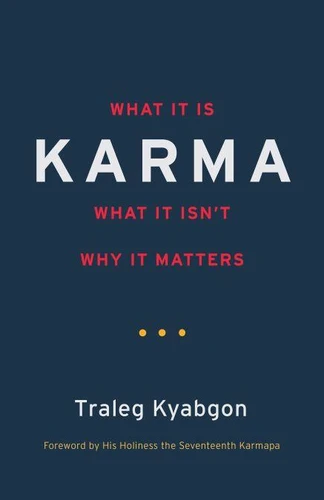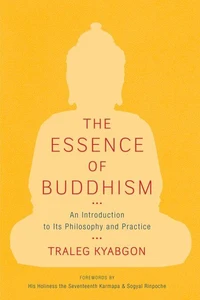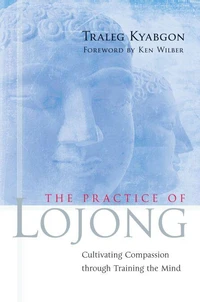Karma. What It Is, What It Isn't, Why It Matters
Par :Formats :
Disponible dans votre compte client Decitre ou Furet du Nord dès validation de votre commande. Le format ePub protégé est :
- Compatible avec une lecture sur My Vivlio (smartphone, tablette, ordinateur)
- Compatible avec une lecture sur liseuses Vivlio
- Pour les liseuses autres que Vivlio, vous devez utiliser le logiciel Adobe Digital Edition. Non compatible avec la lecture sur les liseuses Kindle, Remarkable et Sony
- Non compatible avec un achat hors France métropolitaine
 , qui est-ce ?
, qui est-ce ?Notre partenaire de plateforme de lecture numérique où vous retrouverez l'ensemble de vos ebooks gratuitement
Pour en savoir plus sur nos ebooks, consultez notre aide en ligne ici
- Nombre de pages176
- FormatePub
- ISBN978-0-8348-0090-8
- EAN9780834800908
- Date de parution30/06/2015
- Protection num.Adobe DRM
- Taille830 Ko
- Infos supplémentairesepub
- ÉditeurShambhala
Résumé
A master of Tibetan Buddhism cuts through prevalent misconceptions around karma and rebirth to get to the root cause of our suffering-and how we can end it The Buddha's teaching on karma (literally, "action") is nothing other than his compassionate explanation of the way things are: our thoughts and actions determine our future, and therefore we ourselves are largely responsible for the way our lives unfold.
Yet this supremely useful teaching is often ignored due to the misconceptions found in popular culture, especially oversimplifications that make it seem like something not to be taken seriously. Karma is not simple, as Traleg Kyabgon shows, and it's to be taken very seriously indeed. In this book, Kyabgon cuts through the persistent illusions we cling to about karma to show what it really is-the mechanics of why we suffer and how we can make the suffering end.
He explains how a realistic understanding of karma is indispensable to Buddhist practice, how it provides a foundation for a moral life, and how understanding it can have a transformative effect on the way we relate to our thoughts and feelings and to those around us.
Yet this supremely useful teaching is often ignored due to the misconceptions found in popular culture, especially oversimplifications that make it seem like something not to be taken seriously. Karma is not simple, as Traleg Kyabgon shows, and it's to be taken very seriously indeed. In this book, Kyabgon cuts through the persistent illusions we cling to about karma to show what it really is-the mechanics of why we suffer and how we can make the suffering end.
He explains how a realistic understanding of karma is indispensable to Buddhist practice, how it provides a foundation for a moral life, and how understanding it can have a transformative effect on the way we relate to our thoughts and feelings and to those around us.
A master of Tibetan Buddhism cuts through prevalent misconceptions around karma and rebirth to get to the root cause of our suffering-and how we can end it The Buddha's teaching on karma (literally, "action") is nothing other than his compassionate explanation of the way things are: our thoughts and actions determine our future, and therefore we ourselves are largely responsible for the way our lives unfold.
Yet this supremely useful teaching is often ignored due to the misconceptions found in popular culture, especially oversimplifications that make it seem like something not to be taken seriously. Karma is not simple, as Traleg Kyabgon shows, and it's to be taken very seriously indeed. In this book, Kyabgon cuts through the persistent illusions we cling to about karma to show what it really is-the mechanics of why we suffer and how we can make the suffering end.
He explains how a realistic understanding of karma is indispensable to Buddhist practice, how it provides a foundation for a moral life, and how understanding it can have a transformative effect on the way we relate to our thoughts and feelings and to those around us.
Yet this supremely useful teaching is often ignored due to the misconceptions found in popular culture, especially oversimplifications that make it seem like something not to be taken seriously. Karma is not simple, as Traleg Kyabgon shows, and it's to be taken very seriously indeed. In this book, Kyabgon cuts through the persistent illusions we cling to about karma to show what it really is-the mechanics of why we suffer and how we can make the suffering end.
He explains how a realistic understanding of karma is indispensable to Buddhist practice, how it provides a foundation for a moral life, and how understanding it can have a transformative effect on the way we relate to our thoughts and feelings and to those around us.






